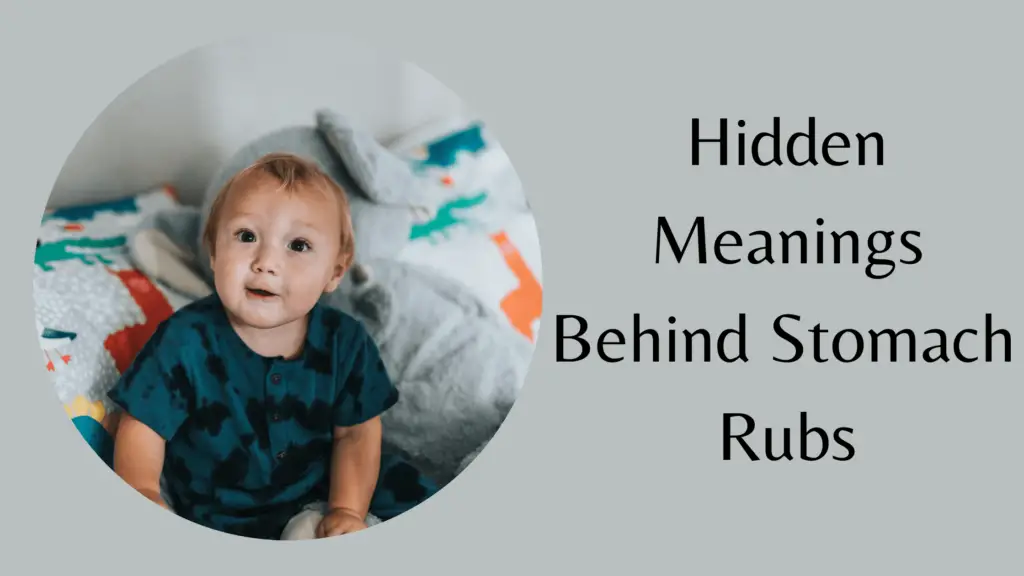Toddlers, in particular, have a unique way of expressing themselves, often leaving parents puzzled by their actions. One such behavior that may leave you wondering is when a toddler rubs your stomach. So, what does it mean when a toddler rubs your stomach?
What Does It Mean When a Toddler Rubs Your Stomach
A toddler rubbing your stomach is often associated with a show of affection, imitation, curiosity and communication.
Meaning No. 1: Affection and Bonding
Toddlers are known for their capacity to love deeply, even if they can’t articulate it in words. They often express their affection through physical touch. When a toddler rubs your stomach, it’s a sign of their attachment and love for you. They feel close to you and comfortable in your presence, and this physical contact is their way of reinforcing that emotional connection.
Affection is a universal language, and toddlers are fluent in it. Their small, tender gestures, like hugs, kisses, and stomach rubs, are their way of saying, “I love you.” These gestures are not just expressions of affection; they are also an acknowledgment of the security and warmth they feel in your presence. In essence, your toddler’s stomach rub is their way of saying, “You mean the world to me.”
Strengthening the Parent-Child Bond
Physical touch serves as a potent tool for fortifying the connection between parents and toddlers. When you reciprocate your toddler’s affectionate actions, like snuggling or permitting them to gently touch your belly, you are nurturing a sense of secure attachment. This secure attachment holds immense importance for your child’s emotional well-being and paves the way for wholesome relationships in the future.
The parent-child bond stands as a fundamental pillar in a child’s growth. It serves as the bedrock for their feelings of safety and trust in the world around them. When your toddler reaches out to touch your stomach, they are not solely seeking physical proximity but also emotional closeness. By responding with warmth to their affection, you are cultivating a profound and enduring connection that will exert a positive influence on their relationships throughout their life journey.
Meaning No. 2: Curiosity and Exploration
Toddlers are inherently curious beings. They have an insatiable desire to explore the world around them. When a toddler rubs your stomach, they might be using this physical contact as a means to explore and understand your body. They’re discovering the shape, texture, and warmth of your stomach, which is a part of their natural inclination to learn about their environment.
Curiosity is the driving force behind a toddler’s exploration. They want to touch, feel, taste, and see everything they encounter. Your stomach, with its unique contours and sensations, becomes one of their many subjects of curiosity. When they rub it, they are engaged in a sensory exploration, trying to make sense of the world through their sense of touch.
Using Touch to Understand the World
Touch is one of the primary ways toddlers gather information about their surroundings. It’s akin to their hands-on method of research. By touching and feeling objects, including your stomach, they gain a better understanding of the world. So, when your toddler’s tiny hand explores your tummy, they’re essentially conducting their own investigation.
Toddlers are little scientists in the making. They rely on their senses to conduct experiments and collect data about the world around them. Your stomach is just one of their many subjects, and their curious touch is their way of gathering information. It’s as if they are saying, “What is this? How does it feel? What can I learn from it?” Embracing this curiosity and providing opportunities for exploration is an essential part of their development.
Meaning No. 3: Seeking Comfort and Reassurance
Toddlers often engage in self-soothing behaviors when they’re feeling anxious, upset, or seeking reassurance. Rubbing your stomach can be one of these self-soothing actions. The gentle, rhythmic motion can provide them with a sense of comfort and security, helping them cope with their emotions.
Self-soothing is a vital skill for toddlers to learn. It helps them regulate their emotions and manage stress. When your toddler rubs your stomach, they are essentially using this tactile activity as a way to calm themselves. The repetitive motion and the physical connection with you provide a sense of stability in moments of distress.

Comforting Through Touch
Physical touch has a soothing effect on toddlers. When they rub your stomach, they may be seeking comfort from you, much like how they seek comfort from their favorite blanket or stuffed animal. It’s a way for them to feel safe and reassured in your presence.
The power of touch in providing comfort cannot be overstated. Your toddler associates your touch with safety and love. When they are upset or anxious, seeking your physical presence and touch is a natural response. Your stomach, being close to their level, is easily accessible and serves as a source of comfort. It’s a tangible reminder that you are there to provide solace and security.
Meaning No. 4: Communication of Needs
Toddlers have basic needs, and they use various means to communicate them. Rubbing your stomach might be their way of letting you know that they’re hungry or thirsty. It’s their non-verbal signal that they require sustenance.
Hunger and thirst are fundamental needs that toddlers rely on their caregivers to fulfill. When your toddler rubs your stomach, they are sending a clear message: “I need something to eat or drink.” While they may not have the words to express this need verbally, their actions speak volumes. It’s an excellent opportunity to respond promptly to their needs and provide nourishment.
Discomfort or Tummy Troubles
Sometimes, a toddler rubbing your stomach might be an indication of physical discomfort. If they have a tummy ache or gas, they may instinctively rub the area that’s bothering them. In such cases, it’s essential to pay close attention to their cues and address any potential discomfort they may be experiencing.
Tummy troubles are common among toddlers. Their digestive systems are still maturing, and they may experience discomfort from time to time. When your toddler rubs your stomach, it’s a signal that something doesn’t feel quite right in their own tummy. As a parent, it’s crucial to investigate further and offer comfort or remedies to alleviate their discomfort.
Meaning No. 5: Imitation and Learning
Toddlers are excellent imitators. They often mimic the actions and behaviors they observe in adults or older children. If they’ve seen someone else, such as a parent or sibling, rubbing their own stomach or someone else’s, they may imitate it without necessarily understanding the full significance. This imitation is a part of their learning process.
Imitation is a fundamental way in which toddlers learn about the world and acquire new skills. They observe the actions of those around them and attempt to replicate them. When a toddler rubs your stomach, it might be because they’ve seen someone else do it, and they are curious to try it themselves.
Role of Modeling in Toddler Development
As parents and caregivers, our actions serve as models for our children. What we do and how we behave shapes their understanding of the world. So, if you’ve ever rubbed your own stomach or shown affection in this way, your toddler might be picking up on this behavior and incorporating it into their repertoire of expressions.

Modeling is a powerful tool in teaching children about appropriate behaviors and social norms. Your actions, whether intentional or unintentional, have a profound impact on your toddler’s development. If you often engage in affectionate gestures like stomach rubbing, your child is likely to mimic these behaviors as they seek to understand how to interact with others.
Related: Why Your Toddler Obsessed with Your Belly Button
Responding to a Toddler’s Stomach Rub
Understanding the potential meanings behind a toddler rubbing your stomach is just the first step. It’s equally important to respond appropriately to your child’s gestures.
Paying Attention to Context and Cues
When your toddler engages in this behavior, it’s crucial to consider the context. Is it a moment of affection, exploration, or a potential sign of discomfort? Paying attention to your child’s overall demeanor and any accompanying cues can help you interpret their actions accurately.
Context is the key to understanding your toddler’s intentions. Are they smiling and giggling, indicating a playful mood, or do they appear distressed or uncomfortable? Are they rubbing your stomach during mealtime, suggesting hunger, or is it happening at bedtime, signaling a desire for comfort? By observing the circumstances surrounding the stomach rub, you can gain valuable insights into what your toddler is trying to communicate.
Addressing Potential Needs or Concerns
If your toddler’s stomach rub appears to be linked to discomfort or hunger, be sure to address their needs promptly. Offer them food or comfort as required. If it’s an affectionate gesture, reciprocate with love and warmth to reinforce the emotional bond.
Responding to your toddler’s needs and concerns is a fundamental aspect of parenting. When they rub your stomach to convey hunger or discomfort, taking immediate action to meet those needs fosters trust and security. Conversely, when it’s an expression of affection, responding with affectionate gestures of your own reinforces the bond between you and your child.
Encouraging Healthy Expressions of Affection
Physical touch is a vital aspect of parent-child relationships, and encouraging healthy expressions of affection is essential. Embrace these moments of closeness and use them as opportunities to strengthen your connection with your toddler.
Affectionate gestures between parents and children are not only heartwarming but also essential for emotional well-being. When your toddler rubs your stomach as an expression of affection, responding with a warm hug, a gentle pat on the back, or a loving smile sends a powerful message. It tells your child that their affection is reciprocated and appreciated, creating a positive feedback loop of love and security.
Conclusion
In the intricate world of toddler-parent interactions, a toddler rubbing your stomach is just one of the many expressions of love, curiosity, and comfort that you’ll encounter. Embrace the uniqueness of your child’s gestures, and cherish these moments of connection. Understanding the significance behind their actions allows you to respond with empathy and love, nurturing a strong and loving parent-child bond that will last a lifetime.







